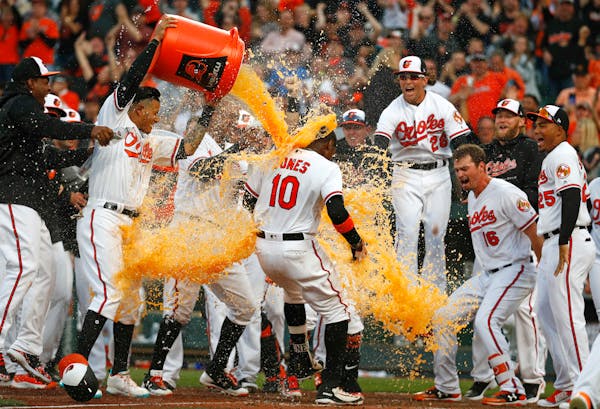BALTIMORE – For a big-league manager running an ambitious team, every decision is binary. Paul Molitor can't diversify investments. He may not paint anything beige.
Every decision he makes could bruise an ego or lose a game, even if he employs statistically supportable logic. So during the Twins' 3-2, 11-inning loss to the Baltimore Orioles on Opening Day at Camden Yards, Molitor had no choice but to make a series of difficult and intriguing calculations.
The reigning American League Manager of the Year pinch hit for his rising-star center fielder. He pulled his starting pitcher before he had allowed a run. He called in his closer to finish the 10th, then brought him back for the 11th. And he employed a five-man infield as if he knew where the ball would be hit.
"It was a good game, man," Molitor said with a smile. "There was a lot of stuff for the first game of the year."
His most difficult decision might have also been the most logical.
The Twins trailed 2-0 in the top of the ninth. The bases were loaded with two outs. Byron Buxton was due to hit.
Last year, Buxton hit .314 with a .912 OPS after July 4. He has power to all fields and the speed to beat out any groundball that isn't a routine play.
He also has a less-than-perfect swing and is vulnerable against good righthanded pitching. He was 1-for-3 Thursday, hitting a pitch over the middle of the plate for a single but looking uncomfortable against pitches away.
Baltimore closer Brad Brach was on the mound. He threw a fastball in the mid-'90s and a splitter that dives off the plate — the splitter being the kind of pitch that most bothers Buxton.
Molitor replaced Buxton with Robbie Grossman. Grossman doesn't have Buxton's power, speed or potential, but he possesses a trait dear to Molitor: the ability to take a quality at-bat.
"I had a good feeling he was going to put it in play and take a good at-bat and we were able to tie the game," Molitor said. "It was just one of those gut situations where you're going to put the guy up there that you think might have a better chance to get a hit or extend an inning."
Grossman worked the count to 3-and-1, then nudged a tying two-run single to center. "I was actually surprised he swung at that pitch," third base coach Gene Glynn said. "Because he goes to 3-and-2 a lot."
Glynn has been in pro ball since 1979 and has been coaching in the big leagues or managing in the minors since 1994. He was asked whether pinch hitting for Buxton is difficult for Molitor. He paraphrased "Star Trek."
"As Spock used to say, the good of the one doesn't outweigh the good of the many," he said. "Hey, everybody has a role."
Molitor pulled started Jake Odorizzi after six shutout innings and 93 pitches, a common move in modern baseball. "I don't think you really want to flirt much with high numbers with so many games to go," Molitor said.
Molitor called in new Twins closer Fernando Rodney to get out of a 10th-inning jam, then Rodney allowed Adam Jones, the first hitter in the 11th, to hit the winning home run. Molitor said the scheduled day off Friday made him willing to keep Rodney in the game.
In the bottom of the 10th, Molitor brought center fielder Eddie Rosario into the infield with one out and the bases loaded. Baltimore's Jonathan Schoop hit a grounder at shortstop Eduardo Escobar, who was in perfect position because of the alignment, and Escobar threw home to start a 6-2-3 double play. "Hey, it worked," Molitor said with a chuckle.
"I thought Molly managed a heckuva game," Glynn said. "He was poised, and I was glad he went with veterans in key situations."
A manager's job is to seek infinitesimal advantages while considering player development, clubhouse mood, calendar and the reality that even the shrewdest moves can backfire.
I admire managers who make moves they believe in, rather than those designed to preempt second-guessing. Molitor passed that test again on Opening Day.

Souhan: Why Tiger Woods should keep swinging
Souhan: Scheffler wins Masters again, shows what makes him special
Morikawa falters in final round at Masters

Keeping up with the Joneses who helped design Augusta National's classic back nine


